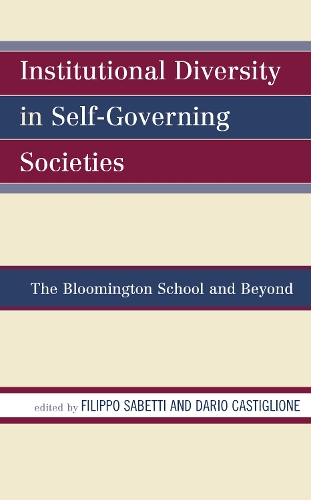
Institutional Diversity in Self-Governing Societies: The Bloomington School and Beyond
(Hardback)
Publishing Details
Institutional Diversity in Self-Governing Societies: The Bloomington School and Beyond
By (Author) Filippo Sabetti
Edited by Dario Castiglione
Contributions by Paul Dragos Aligica
Contributions by Rosolino A. Candela
Contributions by Dario Castiglione
Contributions by Michael A. Fotos
Contributions by Anas Malik
Contributions by Ronald J. Oakerson
Contributions by Margaret M. Polski
Contributions by Filippo Sabetti
Bloomsbury Publishing PLC
Lexington Books
27th December 2016
United States
Classifications
Professional and Scholarly
Non Fiction
Political science and theory
Political economy
Economic theory and philosophy
320.6
Physical Properties
Hardback
292
Width 159mm, Height 238mm, Spine 27mm
608g
Description
The work of Elinor and Vincent Ostrom represents a distinctive contribution to the study of political economy, public policy and administration, collective action, and governance theory. Efforts to present a comprehensive overview of the Bloomington School that grew around the Workshop in Political Theory and Policy Analysis (now renamed the Ostrom Workshop), which they founded more than 40 years ago, received new impetus with the award of the Nobel Memorial Prize in Economic Science to Elinor Ostrom in 2009. Since then, renewed attempts have been made to map the Ostroms contributions to theories of polycentric governance and collective action, and to multi-methods and comparative institutional analysis of ways of managing social and ecological systems, common pool resources, public economies, and metropolitan reform. The open-ended and multiform nature of the Ostroms research program defies a single comprehensive overview; yet, it is a stimulus towards both creativity and disciplinary cross-fertilization in social science research. What sets this volume apart is that it brings together theory and practice, models and work on the ground, design and creativity, empirics and norms, to outline the significance of the Ostroms research program for the future. Each contribution to the volume takes the Ostromian perspective as the point of departure, amplifies it and explores the ground for future work by engaging with other approaches and areas of research with which the Bloomington School has some affinities. This way of testing and extending the ideas and methods of the Ostroms is particularly appropriate since their research program, initiated and nurtured through the Workshop, has always been in-between different fields and sub-fields in the social sciences (political science, economics, public administration, law, history, anthropology), cultivating a strong interdisciplinary way of doing research and exploiting the virtuous circle between theory, analysis, model building, and empirical research. Engaging in a creative dialogue with ideas and methods of other research programs is a way of sharpening ones analytic tools, while renovating ones own vision of social research. This volume is a way of thinking through and beyond the Bloomington School.
Reviews
The contributors develop truly innovative extensions of the basic themes explored by Vincent and Elinor Ostrom, and apply them to several important topics, some very old (democratic citizenship, state of nature), others fresh off todays headlines (sustainability, partisan gridlock, police shootings). This volume is full of ideas and promising directions for future research, and demonstrates the continued vibrancy of the Bloomington School tradition. -- Michael D. McGinnis, Indiana University, Bloomington
Sabetti and Castiglione have convened a marvelous group of scholars to demonstrate in spades the enduring influence and relevance of Vincent and Elinor Ostroms work for issues in political theory and public policy. The volumes wide-ranging chapters not only apply concepts and analytical approaches associated with the Ostroms and the Bloomington School but expand on them in creative and useful ways. In such capable hands, the Bloomington School is certain to remain a leader in institutional analysis, public choice, and political economy. -- Daniel H. Cole, Indiana University, Bloomington
Author Bio
Filippo Sabetti is professor of political science at McGill University. Dario Castiglione teaches political theory at the University of Exeter.
